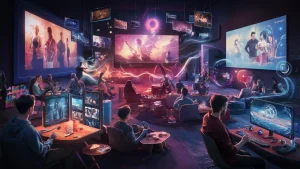
Introduction
Artificial Intelligence (AI) has become a game-changer in the media industry. From personalized content recommendations to fostering meaningful audience interactions, AI is redefining how media companies engage with their viewers. In this article, we will explore how AI is transforming audience engagement, its benefits, and its impact on community building.
The Role of AI in Audience Engagement

AI is helping media platforms understand their audiences better. By analyzing viewer preferences, AI can deliver customized content that keeps audiences interested. For example, streaming platforms like Netflix and Spotify use AI algorithms to suggest shows, music, or podcasts based on individual choices. This level of personalization improves the audience experience, making users feel valued and connected.
How AI Builds Community in Media

AI is not just about content recommendations. It also helps media platforms build strong communities. Social media platforms use AI tools to create spaces where users can connect over shared interests. Features like group recommendations, AI-moderated comments, and smart filters ensure that online communities remain positive and engaging.
For example, Facebook and YouTube use AI to moderate content and identify trends, helping to build safe and interactive communities. These AI tools encourage collaboration, discussion, and a sense of belonging.
How AI is Changing Content Recommendations

AI has made it easier for media companies to recommend content that people will enjoy. Platforms like Netflix and YouTube use AI to suggest shows, movies, and videos based on what a person has watched before.
For example, if someone watches a lot of action movies, AI will recommend other action films that might interest them. This makes it easier for viewers to find content they like, and it keeps them engaged for longer periods. AI is also helpful for discovering new content that a viewer might not have found on their own.
AI Enhances Real-Time Interaction

Another way AI is transforming audience engagement is through real-time interaction. Many websites and apps use AI-driven chatbots that can answer questions instantly. This allows users to get help without waiting for a human representative. Chatbots can also offer personalized suggestions based on what the user is looking for.
For example, if someone is browsing a streaming service, the chatbot might recommend a new show based on their previous choices. Real-time interaction helps create a more responsive and engaging experience for users.
AI Helps Media Companies Understand Audience Preferences
AI is very good at analyzing large amounts of data. This means media companies can learn a lot about their audience’s likes and dislikes. By looking at what viewers watch, how long they watch it, and even what they talk about on social media, AI can give companies valuable insights into what people want.
These insights allow companies to create content that appeals to a specific audience, making it more likely that viewers will engage and stay connected with the platform. This data-driven approach helps companies stay ahead of trends and better serve their audience.
AI’s Impact on Advertising

AI has also made advertising more effective. With AI, ads can be tailored to each viewer based on their interests and behaviors. For example, if someone often shops online for clothes, they might see ads for new fashion items.
By personalizing ads, companies can make sure they are reaching the right people with the right message. This leads to higher engagement and better results for advertisers. AI also helps track how well ads are performing, so companies can adjust their strategies if needed. Overall, AI makes advertising more relevant and impactful for audiences.
The Growing Role of AI in Social Media
Social media platforms use AI to understand what users are interested in and to help them find content that matches their interests. AI helps recommend posts, videos, and accounts to follow based on user activity. It can also analyze comments, likes, and shares to determine what types of content are popular at any given time.
This helps companies create content that resonates with their audience and keeps users engaged. AI also helps identify trends on social media, allowing companies to stay current and keep their content fresh and appealing to viewers.
The Potential for AI to Improve User Experience

As AI continues to develop, it will offer even more ways to improve the user experience. In the future, AI could help create interactive content where viewers can make choices that affect the outcome of a story, like in video games or interactive TV shows.
AI will also get better at understanding emotions, allowing it to create content that connects with viewers on a deeper level. These advancements will make the media experience even more engaging and enjoyable, helping companies build stronger relationships with their audience. The future of AI in media is bright, and it will continue to enhance how we interact with and enjoy content.
AI and the Personalization of Content
AI is transforming how media companies personalize the content they offer. It looks at data from users, like what they watch or listen to, and uses that to suggest more things they might like.
For example, if someone watches a lot of romantic comedies, AI will recommend other similar movies or shows. This personalization helps people find new content faster and makes their experience more enjoyable. The more data AI collects, the better it can understand individual preferences, giving users a more tailored media experience.
The Importance of AI in Audience Retention

Keeping an audience engaged is one of the biggest challenges for media companies. AI helps solve this problem by predicting what viewers will enjoy and making suggestions based on their past behavior.
This can increase the chances of people sticking with a service for a longer time. If a platform can constantly suggest content that matches a person’s interests, it becomes harder for them to get bored and leave. In this way, AI helps companies keep their audience happy and loyal, increasing the chances of longer-term success.
The Rise of AI-Powered Content Creation
AI is not just changing how we find content; it’s also changing how it’s created. AI can help writers and filmmakers come up with ideas or even write scripts.
For example, some platforms are using AI to help create personalized stories for viewers, where the plot changes based on the viewer’s choices. This makes content more interactive and interesting. AI tools are also being used to improve video editing, making the production process faster and more efficient. With AI, content creation is becoming more dynamic and can be made to fit the preferences of a specific audience.
AI and Content Moderation

Another important way AI is helping media companies is through content moderation. On social media and video-sharing platforms, there are millions of posts, comments, and videos shared every day. It would be impossible for humans to check them all.
AI can automatically review content and flag inappropriate material, such as offensive language or harmful content. This helps create a safer and more welcoming online environment. By using AI, platforms can quickly and effectively manage user-generated content, ensuring that the experience remains positive for everyone.
AI and Interactive Media
Interactive media is becoming more popular thanks to AI. With AI, viewers can now interact with the content they are watching in new and exciting ways. For instance, interactive TV shows or games allow viewers to make decisions that influence the outcome of the story.
AI can also help create more personalized interactions based on a user’s preferences. This type of engagement makes the media experience feel more immersive and allows audiences to feel more in control of the content they consume.
Overcoming Challenges with AI in Media
Although AI brings many benefits, there are still some challenges to overcome. One of the biggest challenges is making sure that AI doesn’t limit creativity or the variety of content. While AI is great at making recommendations based on what someone likes, it can sometimes keep suggesting similar things, which could make the experience feel repetitive.
To avoid this, media companies need to ensure that AI works alongside human creativity, offering a balance between personalized content and new, unexpected ideas. This way, AI can enhance the media experience without limiting it.
The Future of AI in Media

Looking ahead, the future of AI in media is bright. As technology improves, AI will become even better at understanding what audiences want. It could even lead to more interactive experiences, where viewers help shape the content they watch.
For example, in the future, AI could allow people to influence the direction of a TV show or game in real time. Additionally, AI will continue to help companies create content more efficiently and make it even more personalized. With these advances, AI will play an even bigger role in media and audience engagement in the years to come.
Analysis Table: AI in Media Engagement
| Key Area | Impact of AI | Benefits |
|---|---|---|
| Personalized Content | Suggests content based on user data | Improved user experience |
| Community Building | Creates online groups and interactions | Stronger audience relationships |
| Content Moderation | Monitors and removes harmful content | Safer online communities |
| Real-Time Interaction | Enables live engagement tools | Higher audience participation |
| Insights and Analytics | Tracks audience behavior | Data-driven strategy improvement |
Comparative Table: Traditional vs AI-Driven Audience Engagement
| Aspect | Traditional Engagement | AI-Driven Engagement |
| Content Delivery | Generalized content | Personalized content |
| Audience Interaction | Manual and time-consuming | Automated and real-time |
| Community Building | Limited tools for connection | AI tools for fostering communities |
| Content Moderation | Human effort with delays | AI automation for faster results |
| Data Insights | Basic metrics and feedback | Advanced analytics and predictions |
Conclusion
AI is transforming the way media platforms engage with their audiences. By delivering personalized content, fostering communities, and enabling real-time interactions, AI makes media engagement smarter and more effective. While challenges like privacy concerns and algorithmic bias remain, the benefits far outweigh the drawbacks. With responsible implementation, AI will continue to revolutionize audience engagement and build stronger communities in the digital age.









